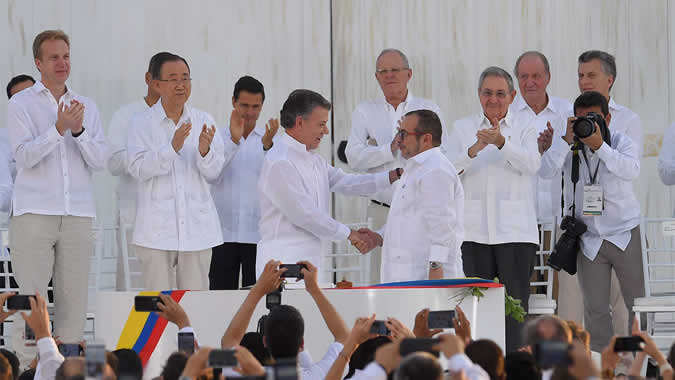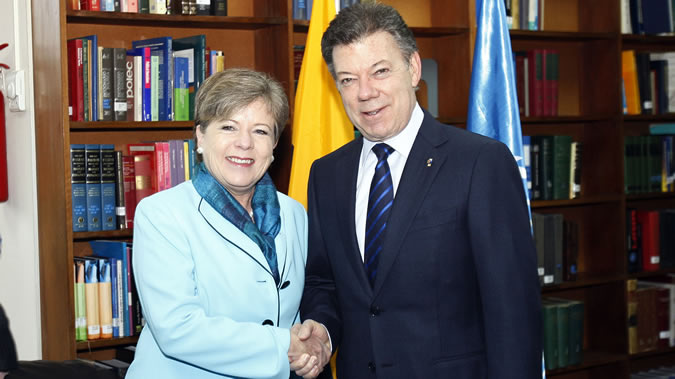ECLAC Will Accompany Colombia in its Consolidation of Peace and its National Development Project
The organization’s Executive Secretary, Alicia Bárcena, participated in Cartagena in the signing ceremony of the agreement that ended more than five decades of armed conflict.

The Executive Secretary of the Economic Commission for Latin America and the Caribbean (ECLAC), Alicia Bárcena, participated on Monday in Cartagena de Indias in the signing ceremony in which the Colombian government and the Revolutionary Armed Forces of Colombia (FARC) penned the historic final peace agreement that put an end to 52 years of armed conflict in that country.
Bárcena joined United Nations Secretary-General Ban Ki-moon and 15 Heads of State from Latin America who were present at the ceremony, headed by President Raúl Castro of Cuba, whose country hosted the talks to end the war between the Colombian State and the FARC over the course of four years and seven months.
“After more than half a century of violence, Colombia writes the first chapter of its future of peace with a fraternal hand. It is an honor for ECLAC to witness this event and to accompany all Colombians in the process of consolidating their future and in the building of their own sustainable national development project,” ECLAC’s Executive Secretary stated.
“Peace in Colombia is not just a question of putting down arms, it is a commitment by everyone to a society of justice, equality and dignity. It was greatly moving for me to accompany President Santos, and the Colombian people, in submitting the peace document to the Security Council and the UN Secretary-General on Monday, September 19, in New York,” Bárcena added.
The Executive Secretary explained that the agreement is the definitive expression of a social compact, for reconciliation, integration and development. She insisted on the importance of what was agreed and on ensuring that it lead to a great national spirit that embraces integration, equality, and the pacific and democratic channeling of political differences.
In a public statement issued on June 23—the date on which the successful end to the peace negotiations was announced in Cuba—Alicia Bárcena also indicated that Colombia has the capacity of its people, its vast natural and human wealth, to embark on a future without threats. This outcome is also the tangible demonstration of our region’s endogenous ability to resolve its own conflicts, she stated.
On that occasion she also expressed her recognition of the governments of Cuba and Norway, which were the guarantors of the process, as well as Chile and Venezuela, which accompanied the talks. “All of their efforts have written one of the brightest chapters of diplomacy and multilateral commitment, with our best civilizing values,” Bárcena said.
“Now, the Colombian people have a date with history on October 2, when the plebiscite will be held, which we hope will ratify the agreement to achieve stable and lasting peace,” the senior United Nations official stressed.
Bárcena said that all economic and social sectors will enjoy direct and indirect benefits from the finalization of the conflict. She noted that building peace will be a long-term process, a social compact to close inequality gaps. “We trust that the international community, and the region’s countries especially, will continue to support Colombia in the implementation of the accords. In this beautiful undertaking, they can always count on ECLAC’s good will and capacities,” she said.
Related content

ECLAC Welcomes Signing of Agreement that Ends the War in Colombia
The Executive Secretary of the regional organization, Alicia Bárcena, issued a statement that describes the achievement as “one of the brightest chapters of diplomacy and multilateral commitment,…
Subregional headquarter(s) and office(s)
National Office, BogotaCountry(ies)
- Colombia
Contact
Public Information Unit
- prensa@cepal.org
- (56 2) 2210 2040